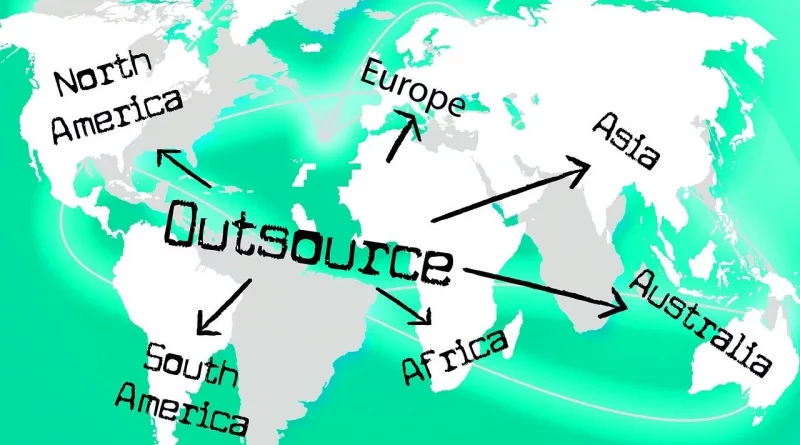Outsourcing vs. offshoring in casino software development
Planning to create your own casino program, website or app? You have several approaches to software development to choose from – in-house work is far from the only option available nowadays. A much more popular method is to leverage either outsourcing or offshoring, that is to partner with an external company responsible for software work. What are the differences between outsourcing and offshoring? Which one is the right choice for you? Find out with us!
Offshoring vs. outsourcing – let’s take a quick glance at the definitions
Firstly, before proceeding to comparing the two options, you should learn about what outsourcing and offshoring actually are. They’re both remarkably similar in principle, roughly meaning using an external, third-party company to implement a project for you. What’s the difference between offshoring and outsourcing, though? Developer outsourcing means hiring a software team to work on your application or website – you can also encounter that term in the world of marketing, customer service, as well as services in general. It can refer to making the whole project or just a specific part of it.
How do we define offshoring? You can look at it as a form of outsourcing that’s done using a partner located in a foreign country. The goal is usually to cut down on costs while at the same time having access to the same level of skill, experience and expertise, in turn improving the quality of your product by freeing up your resources. A popular offshoring example is contacting one of the various companies located in emerging, low-cost IT markets as a client in a country where developers are more expensive, such as hiring developers from the CEE region or the Indian subcontinent. It can, however, refer to any form of outsourcing developer work outside the borders of your country.
While both of those approaches are decently similar, there are some distinctions, which might make one or the other work better for you. What’s the difference between outsourcing and offshoring, and which one should you pick?
Outsourcing vs. offshoring arguments in favour of the first option
There are a lot of outsourcing companies examples – it’s a software development method that has been gaining significant popularity over the years. What makes it such an enticing choice for many companies? Here are a couple of reasons to choose to outsource vs. offshore.
- You don’t need to hire your own IT team – as a result, you can focus on growing your business in the areas you feel the most comfortable with. Outsourcing companies have access to the necessary skill set and experience from the get-go, allowing you to smoothly proceed with your projects right from the beginning.
- You can hire the best developers available in your country – in a lot of places, there are several ‘hubs’ where most technological talent is located. Those are usually cities with the best technical universities, or with a lot of investment already happening in the IT space. By using outsourcing, you can easily find the best people for the project you need no matter where you’re located – especially now, with the rise of remote work.
- You have more flexibility – outsourcing companies usually have rather large teams that can work on several projects at once, assigning people between tasks as needed. As such, you don’t need to manage your workforce to achieve your goals: it’s taken care of by the third-party provider.
- You can save on office costs – it’s expensive to not only hire IT professionals, but also provide them with the necessary hardware, software and infrastructure. If you partner up with an external company instead, you can significantly cut down on those expenses.
If you want to find out why outsourcing is the right choice, look no further than several companies that made it work. Which is the best example of outsourcing? Slack, WhatsApp, Alibaba and even Google use this approach – you’ve definitely heard of those apps and services. Third-party teams play a major role in the development of all of them: judging by their success, it’s easy to see why your company can gain a lot from this approach too.
Top reasons to choose offshoring software development
Developing your project with a software team located in an entirely different country can be an even better option. A good example of offshoring is figuring out which parts of the world have lower labour costs in the IT market than the one you’re located in, and then contacting the best companies in that area. Why should you think about software development offshoring?
- Offshoring means remarkably lower costs. You can combine all the savings you get from regular outsourcing, and make them even larger by choosing a third-party partner from another part of the world. Offshoring is different from outsourcing because of precisely this reason: in fact, you can think of it as an even more cost-effective way to develop your software solutions, and, in turn, your business.
- Benefits of offshoring also include more effectiveness – by cutting down on your costs, you can manage your budget better, and assign work productively. At the same time, external companies from other countries will also generally have a huge pool of developers to pick from, making the work flow smoothly.
- Offshoring development can give you access to a massive workforce with enormous potential. It’s especially true for determined software developers from up-and-coming countries that are in the process of breaking into the global IT market. The salaries in that space can be very large locally, thus providing you as the client with the best talent you can find.
Those are not all the advantages of offshore outsourcing, but the three arguments listed above are the most important reasons to choose this approach to software development. Feel free to find out which large companies use this model as well to see how it can support your projects. What’s more, you don’t need to be a large company with a global reach to link up with developers from all over the globe – you can easily find software firms online, or even use another company to help you set up such a partnership.
Offshore vs. outsource – offshoring examples
What are the typical examples of offshoring? You should primarily look at partnerships between companies from the most developed countries, where salaries for IT professionals can be a major roadblock in hiring a sufficiently skilled team, and software firms from emerging markets. The clients are mostly from the USA, the UK, as well as Western European nations, while developers are mostly located in Central and Eastern Europe or the Indian subcontinent. In many of those countries, you can find several companies that do outsourced work – both larger and smaller ones.
Differences between outsourcing and offshoring
The major difference separating those two approaches is the location of the team responsible for developing your projects. When talking about outsourcing, it can mean both companies based in your country and in other parts of the world, though usually it refers to the first option. Offshoring, however, includes exclusively partnering up with foreign companies.
In turn, there are some distinctions between how this kind of partnership is structured. If you want to work with a company from another country, you need to find out if there is any necessary paperwork or other setup beforehand in terms of tax, invoicing, payments, and so on. Outsourcing locally is usually a more straightforward process, which doesn’t differ much from any other transaction between two businesses.
When talking about costs, it mostly depends on your projects and the company you choose. Sometimes a local one will cost less, but often it’s the foreign talent that can save you costs, even after taking into account the additional overhead from conducting international transactions. You should also take into account the quality offered by all the options available to you – this way you can combine savings with implementing a project that perfectly fits your needs.
FAQ
Outsourcing involves using a third-party company to handle certain aspects of your business, such as software development. Offshoring, meanwhile, is a type of outsourcing that involves partnering with a company based in another country. It is generally used to reduce costs while retaining a high level of expertise and skill.
Outsourcing or offshoring can particularly be advantageous for businesses looking to save costs, gain access to a bigger talent pool, and increase their operational flexibility. Additionally, they might not need to spend resources on office space, equipment, and recruitment, thus allowing them to focus more on their core operations.
Outsourcing can offer businesses the chance to work with top talent in their own country, with fewer communication and cultural hurdles than offshoring. It also eliminates challenges related to differing time zones and potential geopolitical risks, which can be a concern with offshoring.
Offshoring can be a more cost-effective choice, especially for companies based in countries where labor costs are high. It provides access to a wider global talent pool, and offshoring to emerging markets could provide access to highly motivated software developers seeking to make a mark in the global IT space.
Several major companies have successfully utilized outsourcing and offshoring in their operations. Companies like Slack, WhatsApp, Alibaba and even Google have used third-party teams for their development tasks. Offshoring examples include partnerships between companies in developed countries like the USA or the UK and development firms in emerging markets such as Central and Eastern Europe or India.




